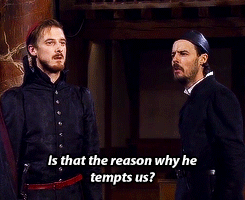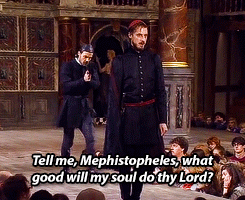anon
quite soon
anon
quite soon
martyr
If someone is martyred, they are killed or made to suffer greatly because of their religious or political beliefs.
shroud
cover
unperplex
to remove confusion from
concoction
A concoction is something that has been made out of several things mixed together.
And pictures in our eyes to get Was all our propagation.
The lovers are imagining their unborn baby while looking into each other's eyes.
propagation
reproduction
ECSTACY
literally means standing outside of oneself, or apart from oneself.
.
I like this one, harsh diction, dark and revengeful tone.
What I will say, I will not tell thee now, Lest that preserve thee ; and since my love is spent, I’d rather thou shouldst painfully repent, Than by my threatenings rest still innocent.
He no longer loves her and, therefore, does not pity her. He wishes that she should suffer deep anguish and repent.
And thee, feign’d vestal, in worse arms shall see : Then thy sick taper will begin to wink, And he, whose thou art then, being tired before, Will, if thou stir, or pinch to wake him, think Thou call’st for more, And, in false sleep, will from thee shrink : And then, poor aspen wretch, neglected thou Bathed in a cold quicksilver sweat wilt lie, A verier ghost than I.
The speaker says when she would find another man asleep and shrinking away from her, she would be left trembling miserably, like an aspen leaf (i.e., the poor, miserable woman, who trembles with fear like a leaf of the Aspen tree. The leave of the aspen is so thin that it shakes even when there seems to be no wind). She would lie there neglected by her lover.
WHEN by thy scorn, O murd’ress, I am dead, And that thou thinkst thee free From all solicitation from me, Then shall my ghost come to thy bed,
The speaker tells his lover that when he is killed by her scorn and rejection; his ghost would appear to her in her bedroom. Love turns into hatred?
For thee, thou need’st no such deceit, For thou thyself art thine own bait : That fish, that is not catch’d thereby, Alas ! is wiser far than I.
The speaker compares himself and his lover to fish. He tells his love to join him in the river and not be caught by other hooks and nets. Then he goes on to say that love is the bait and fish who aren't caught by it are smarter than him.
vigil
A period of keeping awake during the time usually spent asleep, especially to keep watch or pray.
Goat
Refers to the zodiac sign Capricorn which signifies the new year.
If I an ordinary nothing were, As shadow, a light, and body must be here.
Doubting his very existence as a man, the speaker has no feelings, no sense, no desire to be identified anymore.
Oft a flood Have we two wept, and so Drown’d the whole world, us two ; oft did we grow, To be two chaoses, when we did show Care to aught else ; and often absences Withdrew our souls, and made us carcasses.
The speaker is saying that often, so many times in the past he and his love wept together and almost drowned themselves and the world in their tears. This echoes a similar metaphor in A Valediction of Weeping.
I am re-begot Of absence, darkness, death—things which are not.
Out of this “absence, darkness, death,” love has recreated the speaker as if he had been born out of nothingness or nonexistent things.
For I am every dead thing, In whom Love wrought new alchemy. For his art did express A quintessence even from nothingness
He says he feels as though he is dead and like dying things in winter.
bed
may mean flower bed here
The sun is spent, and now his flasks Send forth light squibs, no constant rays
The sun has set and in the darkness of night; the speaker says he can’t rely on the starlight to lead him forward.
minstrelsy
An American theatrical form, popular from the early 19th to the early 20th century, that was founded on the comic enactment of racial stereotypes.
Our ease, our thrift, our honour, and our day, Shall we for this vain bubble’s shadow pay?
Lovers should not use their savings, their honor, their youth and vitality in sexual indulgence, the pleasure of which is as fleeting as the shadows cast by bubbles.
pregnant pot
A container which kept smelly substances that, despite being worthless, were "glorified" by the Alchemist.
O ! ’tis imposture all ; And as no chemic yet th’ elixir got, But glorifies his pregnant pot, If by the way to him befall Some odoriferous thing, or medicinal,
He mocks the practice of Alchemy, which was already discredited.
imposture
An archaic word meaning something false or fraudulent that intrudes
Some that have deeper digg’d love’s mine than I, Say, where his centric happiness doth lie. I have loved, and got, and told, But should I love, get, tell, till I were old, I should not find that hidden mystery.
The speaker says those who have explored love to a deeper level than he has may claim to have found the "centric happiness." But though he has had experience and may continue to do so until he is old, he still wouldn’t have solved the "mystery."
mintage
The action or process of minting coins
forbear
To avoid or refrain from doing something
round ball
That's the earth.
divers shore
On different lands (divers = diverse)
Pregnant
Filled with emotion or significance, rich in meaning or implication
coins
Makes, as a mint foundry stamps/makes coins.
whilst I stay here
This poem is a valediction, meaning that it is an act of saying goodbye to someone.
.
Rhyme scheme: AABBCC. This poem speaks of how the day does not break, but it is the speaker's heart because he and his love "must part." He asks her to stay or his happiness will perish when his love is still new.
Then as an angel face and wings Of air, not pure as it, yet pure doth wear, So thy love may be my love’s sphere ; Just such disparity As is ‘twixt air’s and angels’ purity, ‘Twixt women’s love, and men’s, will ever be.
He seems to have come to a resolution. And he wishes to be encircled with his love.
Thy every hair for love to work upon Is much too much ; some fitter must be sought ; For, nor in nothing, nor in things Extreme, and scattering bright, can love inhere
These lines tell us how love cannot be sustained in extremities.
Whilst thus to ballast love I thought, And so more steadily to have gone, With wares which would sink admiration, I saw I had love’s pinnace overfraught
The speaker contemplates his earlier decision to confine love to the physical realm. He realizes his mistake as he feels love being overwhelmed by the realm of sensuality and superficiality.
And therefore what thou wert, and who, I bid Love ask, and now That it assume thy body, I allow, And fix itself in thy lip, eye, and brow
These lines deal with the speaker's realization that love cannot be abstract. It has to take a form, a shape in order to be actualized.
But since my soul, whose child love is, Takes limbs of flesh, and else could nothing do, More subtle than the parent is Love must not be, but take a body too ;
He says since love is essentially the child of the soul, it has to take a form, like a soul does.
Still when, to where thou wert, I came, Some lovely glorious nothing did I see
The speaker views love as spiritual; he calls it ‘"lovely glorious nothing."
TWICE or thrice had I loved thee, Before I knew thy face or name ; So in a voice, so in a shapeless flame Angels affect us oft, and worshipp’d be. Still when, to where thou wert, I came, Some lovely glorious nothing did I see.
The speaker compares love and his beloved to angels. He says that love is similar to angels. It's formless and shapeless, yet its presence is tangible enough to make us feel its existence.
;
This stanza ends with a semicolon, indicating that the discovery and the revelation are not all that is involved.
specular stone,
A material supposedly used in classical times to cover windows.
Worthies
Refers to a medieval legend about the individuals who represent the epitome of courage. They included three Jews, identified as Joshua, David, and Judas Maccabeus; three pagans, identified as Hector, Alexander, and Julius Caesar; and three Christians, identified as Arthur, Charlemagne, and Godfrey of Bouillon.
epitomize
To serve as the typical or ideal example of
hermitage
A place where a religious person lives on their own, away from the rest of society.
Venus heard me sigh this song ; And by love’s sweetest part, variety, she swore, She heard not this till now ; and that it should be so no more. She went, examined
The speaker announces that Venus, the goddess of secular love, overheard him speaking and declared that she had never before heard anything similar.
CANONIZATION
Canonization is the act by which a Christian church declares that a person who has died was a saint, upon which declaration the person is included in the list of recognized saints, called the "canon". Originally, a person was recognized as a saint without any formal process.
constancy
Fidelity; loyalty
Let me—and do you—twenty know ; Rob me, but bind me not, and let me go.
These lines sound like some kind of Beatles song.
Will no other vice content you ?
The speaker scorns the virtue of fidelity by posing this question.
I CAN love both fair and brown ; Her whom abundance melts, and her whom want betrays ; Her who loves loneness best, and her who masks and plays ; Her whom the country form’d, and whom the town ; Her who believes, and her who tries ; Her who still weeps with spongy eyes, And her who is dry cork, and never cries.
The speaker begins his song by boasting about and listing all the types of women he is capable of loving.
She’s all states, and all princes I ; Nothing else is ; Princes do but play us ; compared to this, All honour’s mimic, all wealth alchemy. Thou, Sun, art half as happy as we, In that the world’s contracted thus ;
Plenty of punctuation bring energy and emotion to the speaker's voice.
.
The bed and the lovers are a microcosm of the universe. The speaker invites the sun to become a part of the whole.
.”
Helplessly in love with his lover, the speaker rather arrogantly belittles the sun by suggesting that his bed is the place to be.
.
The speaker has a go at the sun for invasion of privacy and declares that love isn't subject to the everyday routines, and is certainly no slave to time.
.
The tone is sarcastic. Donne gives the adventurer many impossible tasks, and then even if he can do these he can never find a fair woman.
And swear, No where Lives a woman true and fair.
Hyperbole
If thou be’st born to strange sights, Things invisible to see, Ride ten thousand days and nights, Till age snow white hairs on thee,
If you're born to achieve such impossibilities, to see strange things and invisible sights, then ride for ten thousand days and nights until your hair turns white with age.
Teach me to hear mermaids singing, Or to keep off envy’s stinging, And find What wind Serves to advance an honest mind.
Teach me how to hear the song of the mermaid; how to not be envious; and what helps to better an honest mind.
Let us possess one world ; each hath one, and is one.
The speaker affirms that they totally own a whole new world which they are free to explore.
If our two loves be one, or thou and I Love so alike that none can slacken, none can die.
The speaker suggests that their two loves are not at all imbalanced, their loves are so alike that they can never die.
My face in thine eye, thine in mine appears, And true plain hearts do in the faces rest ; Where can we find two better hemispheres Without sharp north, without declining west ? Whatever dies, was not mix’d equally ; If our two loves be one, or thou and I Love so alike that none can slacken, none can die.
The rhyme scheme is unusual: ababccc The first four lines of each stanza working together in alternate pairs, the last three lines being a conclusion or affirmation.
But suck’d on country pleasures, childishly
This line reinforces the sense of childish existence the two had to go through.
were we not wean’d till then ?
The speaker is implying that they were infants before they loved.
by my troth
in all honesty or truth
THE GOOD-MORROW
An archaic word for "good morning"
.
The poem is about a man trying to get a woman to have sex with him. The flea is a sexual metaphor. Kind of erotic!
Though parents grudge, and you, we’re met, And cloister’d in these living walls of jet.
Even if parents grudge, and you, here we are, Sheltered in the living body of the flea.
Wherein could this flea guilty be, Except in that drop which it suck’d from thee?
The flea, its one act of guilt, To suck a drop of blood from you?
that this
Alliteration
Where we
Alliteration
we would
Alliteration
Cruel and sudden, hast thou since Purpled thy nail in blood of innocence?
Also a hyperbole
Let not to that self-murder added be, And sacrilege, three sins in killing three.
Hyperbole
And this, alas ! is more than we would do
More than we can manage, regrettably.
alas
regrettably
know’st
to know
deniest
to deny
maidenhead
implies virginity
How little that which thou deniest me is ;
Really, it's no great matter, yet you deny me;
MARK
Pay attention to
.
The second stanza develops the argument by introducing religious and theological imagery and language.
.
In the first stanza the speaker uses mostly plain, positive language to highlight the flea's actions.
John Dunne
John Donne (1572–1631)was an English poet and cleric in the Church of England. He is considered the pre-eminent representative of the metaphysical poets. His works are noted for their strong, sensual style and include sonnets, love poems, religious poems, Latin translations, epigrams, elegies, songs, satires and sermons. His poetry is noted for its vibrancy of language and inventiveness of metaphor, especially compared to that of his contemporaries. Donne's style is characterised by abrupt openings and various paradoxes, ironies and dislocations.

FAUSTUS
Fun fact: Do you know "Game of Thrones" star Kit Harington played Doctor Faustus on the London stage a couple of years back?

Exit.
I think this is the "darkest" story we've read in this course thus far. I pretty much enjoyed it because it deals with contrasting themes that fascinate me, such as good vs. evil, damnaton vs. salvation, destiny vs. free will, and power vs. knowledge. This story somehow reminds me of The Canterbury Tales, since both stories question whether a sinner can be pardoned and the reasons why humans are aware of sin and damnation but are not totally understand its importance. Sadly, Faustus doesn't repent in the end, because his heart is "hardened," and he's always struggling to find reasons to renounce magic and repent. He never repents because he loses faith in God and of course, in himself.
Homo, fuge
"Flee, o man!"
Consummatum est
It's finished; and these are the last words of Jesus. https://www.english.op.org/godzdogz/it-is-finished-john-19-30
A sound magician is a mighty god
Implying that he sees Jesus as a magician playing tricks on people, which is one of the themes of this play.
Summum bonum medicinae sanitas
“The highest good of medicine is health,” meaning "medical health is the important."
Si una eademque res legatur[14] duobus, alter rem, alter valorem rei, &c.
If one thing is wanted by 2 people, 1 gets the thing and the other gets the value of the thing.
Si peccasse negamus, fallimur, et nulla est in nobis veritas
Meaning the next line after it: If we say that we have no sin, we deceive ourselves.
Che sera, sera
It is what it is.
Solamen miseris socios habuisse doloris.
Misery loves company.
frivolous
having no sound basis
tormented
torment = to cause severe usually persistent or recurrent distress of body or mind to
Sint mihi dei Acherontis propitii! Valeat numen triplex Jehovoe! Ignei, aerii, aquatani spiritus, salvete! Orientis princeps Belzebub, inferni ardentis monarcha, et Demogorgon, propitiamus vos, ut appareat et surgat Mephistophilis
Let there be, will be gracious to me of God of Acherontis! Farewell, a threefold deity Jehovoe! The fire, air, the spirit of aquatani, welcome! Beelzebub the prince of the East, monarch of burning hell, and Demogorgon, be merciful to you, that he may appear and there should arise a Mephistophilis. Why do you delay? by "Jehovah", Gehenna, and this holy water which I now sprinkle, and the signal of the cross which I now make, and through our prayers, himself now there should arise a Mephistophilis dedicated to us! "
quod tumeraris:[52] per Jehovam, Gehennam, et consecratam aquam quam nunc spargo, signumque crucis quod nunc facio, et per vota nostra, ipse nunc surgat nobis dicatus
"What swells: By Jehovah, Gehenna, and this water which I now sprinkle, and the sign of the cross which I now make, and through our prayers, he dedicated to Azazel now arises in us!"
Enter MEPHISTOPHILIS. I charge thee to return, and change thy shape; Thou art too ugly to attend on me: Go, and return an old Franciscan friar; That holy shape becomes a devil best.
Mephistophilis' first appearance is dramatically effective as he appears so suddenly and in a horrifying shape. He symbolizes hell as it is a place of horror and damnation.
resolute
admirably purposeful, determined
Indian Moors
Indian Moors were a grouping of people who existed in Sri Lanka predominantly during its colonial period. They were distinguished by their Muslim faith whose origins traced back to the British Raj. Therefore, Indian Moors refer to a number of ethnic groups such as Memons, Bohra and Khoja.
I’ll levy soldiers with the coin they bring, And chase the Prince of Parma from our land, And reign sole king of all the[28] provinces; Yea, stranger engines for the brunt of war, Than was the fiery keel at Antwerp’s bridge,[29] I’ll make my servile spirits to invent.
It seems that Faustus doesn't like being ruled by an Italian, the Prince of Parma, and it brings out his more violent side.
Exeunt
used as a stage direction to specify that all or certain named characters leave the stage
KNIGHT. Nay, an you go to conjuring, I’ll be gone. [Exit.]
The knight doesn't believe the show to be genuine and leaves the stage.
O, my leg, my leg!–Help, Mephistophilis! call the officers.–My leg, my leg!
Faustus uses the bargain to cheat the horse-courser, but doesn't seem to realize that Lucifer may be cheating him in their own deal.
Re-enter MEPHISTOPHILIS with grapes.
Mephistophilis leaves and brings back grapes. Wow. That really is magic!
MEPHISTOPHILIS
Prince of the underworld
And yet, methinks, if that death were near, He would not banquet, and carouse, and swill Amongst the students, as even now he doth, Who are at supper with such belly-cheer As Wagner ne’er beheld in all his life.
Wagner is confused because Faustus is enjoying himself, which does not seem like the behavior of someone about to die.
Faustus, call on God.
The scholars tell Faustus to seek God's mercy.
Faustus, farewell.
To the scholars, Faustus' bargain was clearly a horrible deal.
Oft have I thought to have done so; but the devil threatened to tear me in pieces, if I named God, to fetch both body and soul, if I once gave ear to divinity: and now ’tis too late. Gentlemen, away, lest you perish with me.
Faustus is in despair, as the end of his deal with Lucifer is approaching.
Cut is the branch that might have grown full straight, And burned is Apollo’s laurel-bough, That sometime grew within this learned man. Faustus is gone: regard his hellish fall, Whose fiendful fortune may exhort the wise, Only to wonder at unlawful things, Whose deepness doth entice such forward wits To practice more than heavenly power permits.
The chorus tells us that Faustus is gone and we need to see his downfall as an example of why we should not try to learn “unlawful things," and that we should learn from Faustus and set limits to what they seek to learn and know.
since our conference about fair ladies, which was the beautifulest in all the world
Haha, this could be a never-ending argument, but wait, why do scholars ever start arguing this?
HORSE-COURSER. I have been all this day seeking one Master Fustian: mass, see where he is!–God save you, Master Doctor! FAUSTUS. What, horse-courser! you are well met. HORSE-COURSER. Do you hear, sir? I have brought you forty dollars for your horse. FAUSTUS. I cannot sell him so: if thou likest him for fifty, take him. HORSE-COURSER. Alas, sir, I have no more!–I pray you, speak for me. MEPHIST. I pray you, let him have him: he is an honest fellow, and he has a great charge, neither wife nor child. FAUSTUS. Well, come, give me your money [HORSE-COURSER gives FAUSTUS the money]: my boy will deliver him to you. But I must tell you one thing before you have him; ride him not into the water, at any hand. HORSE-COURSER. Why, sir, will he not drink of all waters? FAUSTUS. O, yes, he will drink of all waters; but ride him not into the water: ride him over hedge or ditch, or where thou wilt, but not into the water.
Faustus turns a bundle of hay into a horse and sells it to a horse-courser for forty dollars, warning him not to ride the horse into water.
HORSE-COURSER
Like a used car dealer in today's world
hey-pass
juggler
Doctor Lopus
Domestic physician to Queen Elizabeth, who was put to death for having received a bribe from the court of Spain to destroy her.
treasure
treasury
VALDES, ] friends to FAUSTUS. CORNELIUS
Two German scholars
LUCIFER
King of the underworld
FAUSTUS GIVES TO THEE HIS SOUL: ah, there it stay’d! Why shouldst thou not? is not thy soul shine own?
Does a man have free will to choose whom he'll serve, or does his soul already belong to God or the Devil from the moment he is born?
Now, Faustus, must Thou needs be damn’d, and canst thou not be sav’d: What boots it, then, to think of God or heaven? Away with such vain fancies, and despair; Despair in God, and trust in Belzebub
Faustus is still considering the possibility of salvation for himself. He seems almost desperate here.
Seeing Faustus hath incurr’d eternal death By desperate thoughts against Jove’s[59] deity
Faustus is suggesting there's no turning back now.
SECOND SCHOLAR. Were he a stranger, and not allied to me, yet should I grieve for him. But, come, let us go and inform the Rector, and see if he by his grave counsel can reclaim him.
Second Scholar seems to be a more optimistic guy.
Why, then, belike we must sin, and so consequently die: Ay, we must die an everlasting death.
Faustus thinks that the Bible tells him that he is damned to hell no matter what he does.
voluptuousness
Full of delight or pleasure to the senses
To do whatever Faustus shall command, Be it to make the moon drop from her sphere, Or the ocean to overwhelm the world.
Mephistophilis appears and Faustus demands that this demon serve him.
Come, Mephistophilis.

Enlarge his kingdom

Come, I think hell’s a fable

Is that the reason why[79] he tempts us thus?

Faustus, this,[162] or what else thou shalt desire

Ay, think so still, till experience change thy mind.

Stay, Mephistophilis, and tell me, what good will my soul do thy lord?

By which the spirits are enforc’d to rise: Then fear not, Faustus, but be resolute, And try the uttermost magic can perform.
It's interesting that Faustus speaks of himself in the third person here.
Nay, then, I fear he is fallen into that damned art for which they two are infamous through the world.
The scholars worry about Faustus keeping company with Valdes and Cornelius and therefore falling "into that damned art." I wonder why they see magic as damned art? Why is magic called damned art?
The miracles that magic will perform Will make thee vow to study nothing else. He that is grounded in astrology, Enrich’d with tongues, well seen in[40] minerals, Hath all the principles magic doth require
Cornelius says that Faustus shouldn't find magic too difficult as he knows astrology, languages, and geology, which are the basic principles of magic .
Wagner, commend me to my dearest friends, The German Valdes and Cornelius
As he wants to study magic, he asks his servant, Wagner, to fetch his magician friends, Valdes and Cornelius, to come to help him.
Settle thy studies, Faustus, and begin To sound the depth of that thou wilt profess: Having commenc’d, be a divine in shew, Yet level at the end of every art, And live and die in Aristotle’s works.
Faustus is trying to figure out what he wants to do. He does have many options such as philosophy, medicine, and law, but he thinks they are pointless and boring.
Excelling all whose sweet delight disputes In heavenly matters of theology
He is very good at the studies of theology.
In Germany, within a town call’d Rhodes: Of riper years, to Wertenberg he went, Whereas[4] his kinsmen chiefly brought him up.
Faustus was born in a town called Rhodes in Germany, and he was raised by relatives in Wertenberg.
Si peccasse negamus, fallimur, et nulla est in nobis veritas
This is from the bible, meaning the line that follows: "If we say that we have no sin, we deceive ourselves, and there’s no truth in us."
topless
not exceeded in height by any
ostry
inn
know of
acquainted with
tone
the one
iterating
reciting, repeating
Saba
Refers to the Queen of Sheba, a figure first mentioned in the Hebrew Bible. In the original story, she brings a caravan of valuable gifts for the Israelite King Solomon.
fond
foolish
Why, this is hell, nor am I out of it
"Which way I fly is hell; myself am hell."
erring
wandering
Bene disserere est finis logices
(Latin) "to argue well is the goal of logic"
tabern
tavern
case
couple
bevers
refreshments
Till swoln with cunning,[5] of a self-conceit, His waxen wings did mount above his reach,
This alludes to the myth of Icarus and Daedalus and compares Faustus to the foolish Icarus, because he too foolishly rejects the safe middle ground.
Wertenberg
A historical German territory roughly corresponding to the cultural and linguistic region of Swabia
dalliance
brief romantic relationship
Thrasymene
Battle of Lake Trasimene, where the Carthaginians, lead by Hannibal, defeated the Roman forces.
want
"Want" here means "to lack". Cornelius believes that these three men will want for nothing if they engage in necromancy.
Albertus
Refers to Albertus Magnus, aka. Albert the Great, was one of the most universal thinkers to appear during the Middle Ages. Even more so than his most famous student, St. Thomas of Aquinas, Albert’s interests ranged from natural science all the way to theology. He made contributions to logic, psychology, metaphysics, meteorology, mineralogy, and zoology. He was an avid commentator on nearly all the great authorities read during the 13th Century.
This night I’ll conjure, though I die therefore.
Frustus recognizes the danger in his actions. This ending of Scene 1 seems to be foreshadowing his tragic end.
bill
writing, deed
slop
wide breeches
resolve
satisfy, inform
thorough
through
country
land
desir’d
desire
by’r lady
by our Lady
silk
skill
Resolve
satisfy, inform
cunning
knowledge
Whereas
where
mate
confound, defeat
The Tragical History of Doctor Faustus
Frontispiece to a 1620 printing of Doctor Faustus showing Faustus conjuring Mephistophilis. The spelling "Histoy" is agreed to be a typographical error.

Christopher Marlowe
Christopher Marlowe, also known as Kit Marlowe (baptised 26 February 1564 – 30 May 1593), was an English playwright, poet and translator of the Elizabethan era. Marlowe was the foremost Elizabethan tragedian of his day. He greatly influenced William Shakespeare, who was born in the same year as Marlowe and who rose to become the pre-eminent Elizabethan playwright after Marlowe's mysterious early death. Marlowe's plays are known for the use of blank verse and their overreaching protagonists.

!
Oh I must say I love these sonnets way more than our previous reading, "The Faerie Queene." These sonnets are romantic, witty, and imaginative. They are full of striking similes and metaphors, tons of imagery, great variety of tone, interesting puns, and beautiful rhyme scheme. The themes are universal and timeless. I like those addressed to the young man more than those addressed to the dark lady, because they are much more straightforward and passionate, although I love Sonnet 130 as well, which was what I chose to analyze for my writing project. :)
But why of two oaths’ breach do I accuse thee, When I break twenty?
So the poet is a bigger liar as he has broken twenty oaths (I guess it's a hyperbole?) while his lover breaks two.
In act thy bed-vow broke, and new faith torn
In reality she had broken her marriage-vow.
Who art as black as hell, as dark as night.
Addressing to the dark lady
My love is as a fever longing still
Describing love as sickness seems to be the main theme of this sonnet.
Within be fed, without be rich no more:
Interesting... he is saying feed your inner self and let your body be poor.
Therefore I lie with her, and she with me, And in our faults by lies we flatter’d be
Does it mean the speaker tells lies or he lies in bed with the dark lady?
Till my bad angel fire my good one out.
He is saying his mistress will give his male lover the 'fire," which refers to venereal disease, which is contracted and transmitted by sexual contact.
unjust
The dark lady is untruthful and the speaker suspects adultery.
untutor’d
naive
Thus vainly thinking that she thinks me young,
ha, he's so insecure about their relationship.
Let no unkind ‘No’ fair beseechers kill; Think all but one, and me in that one ‘Will.’
So this dark lady has lots of lovers and he is asking her to accept him also?
Wilt thou, whose will is large and spacious, Not once vouchsafe to hide my will in thine?
WOW.. obvious sexual implication here.
with false compare
by unbelievable, ridiculous comparisons
And yet by heaven, I think my love as rare, As any she belied with false compare.
He ends the poem with praise, calling his love “as rare” as any of the women falsely described in sonnets of others.
My mistress’ eyes are nothing like the sun; Coral is far more red, than her lips red: If snow be white, why then her breasts are dun; If hairs be wires, black wires grow on her head. I have seen roses damask’d, red and white, But no such roses see I in her cheeks; And in some perfumes is there more delight Than in the breath that from my mistress reeks. I love to hear her speak, yet well I know That music hath a far more pleasing sound:
Shakespeare mocks the typical Petrarchan poetry's blazon, which glorifies a woman by comparing each of her body parts to something beautiful or precious. He is saying all the opposites to describe his mistress.
All this the world well knows; yet none knows well To shun the heaven that leads men to this hell.
Everyone knows what lust does to him, yet no one knows it well enough to avoid the heaven that leads men to this hell (no one can resist lust.)
Enjoy’d no sooner but despised straight
As soon as they commit a lustful act, they despise it.
Savage, extreme, rude, cruel
Lust makes people “savage, extreme, rude, cruel.”
dancing chips
Keys that play the notes
bower
A woman's bedroom
Fairing the foul with Art’s false borrowed face
Haha, he's saying even unattractive people can make themselves beautiful with makeup.